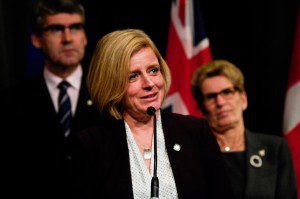(Prime Minister Justin Trudeau, in the foreground, and New Brunswick Premier Brian Gallant, in the background. Julien Gignac/APTN)
Jorge Barrera
APTN National News
Prime Minister Justin Trudeau dodged a question Monday on whether his Liberal government would continue to rely on regulatory review bodies to execute Ottawa’s duty to consult with First Nations on large resource and energy projects like TransCanada’s proposed Energy East pipeline.
Trudeau met with provincial and territorial premiers at the Museum of Nature in Ottawa Monday evening ahead of next week’s global climate change conference in Paris.
During a press conference following the meeting, Trudeau was asked how he planned to increase the level of consultation with First Nations, since it was an issue raised by New Brunswick Premier Brian Gallant earlier in the day. Trudeau also campaigned on improving consultation with First Nations and in mandate letters to his cabinet ministers signalled that fixing the relationship between Ottawa and Indigenous communities was a top priority.
New Brunswick faced intense clashes and demonstrations led by Mi’kmaq resident of Elsipogtog over hydraulic fracturing throughout 2013.
Trudeau dodged the question and instead said his government would be focusing on improving the Canadian public’s trust through “robust environmental and scientific oversight and regulation.” The Liberal government would build that public trust through “the support of the communities that will be affected” and “partnership with First Nation communities,” said Trudeau.
“One of the things that is very clear, is that Canadians understand that we need economic growth, we need to get our resources to market, doing that in the 21th Century requires public trust,” said Trudeau. “We know we need to restore Canadian’s faith that government is working in their long-term interest, not the short term bottom line. We found in our conversation tonight, among the premiers, that everyone gets that deeply and is looking forward to building a strong country that both protects our environment and builds economic opportunities.”
During the election campaign, Trudeau said in a virtual town hall with APTN that he had concerns about the National Energy Board’s (NEB) regulatory review process in relation to First Nation consultation.
Earlier in the day, Natural Resources Canada said in a statement there would be no added consultation with First Nations on the Energy East pipeline outside of the NEB process, which includes hearings specifically geared to receiving traditional Indigenous oral testimony.
The previous Conservative government of Stephen Harper relied on regulatory review bodies, like the NEB, to execute the Crown’s duty to consult and accommodate First Nations.

With the White House’s recent rejection of TransCanada’s Keystone XL pipeline which would have carried Alberta bitumen to the Gulf Coast, the energy industry has now pinned its hopes on the Energy East pipeline as the vehicle that will finally move land-locked crude to tidewater on the East Coast.
The 4,600 kilometre-long pipeline would carry about 1.1 million barrels of crude from Alberta and Saskatchewan to Saint John, N.B., crossing the territories of 155 First Nation communities along the way.
Groups like the Federation of Saskatchewan Indian Nations have stated their support for the project is contingent on a more robust consultation process with First Nations.
Alberta Premier Rachel Notley also said Monday that she hoped her province’s recently released climate change plan, which will place a limit on emissions from the tar sands, would soften opposition to energy infrastructure projects like Energy East.
“We are hopeful, as a result of the action we announced that we will be taking on climate change in Alberta, that we will be able to move forward on the necessary discussion about energy infrastructure and, what I have characterized in the past, in a drama free way,” said Notley. “No question, it’s important for us to be able to communicate to the world that it is possible to be an energy producer in a responsible, sustainable, thoughtful and transparent way.”
Canada is, arguably, the world’s third biggest oil producer. The country is also number three in the world in the production of renewable energy, the premiers said Monday.
The premiers and the prime minister are expected to meet again in three months. One of the topics in that planned discussion will focus on the upcoming inquiry into the high number of murdered and missing Indigenous women and girls.
Trudeau is also planning to meet with Indigenous leaders in mid-December.
@JorgeBarrera











What’s the matter problem reporting the news? What a racist organization.